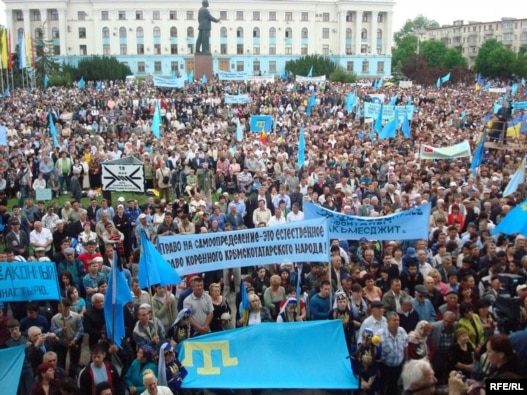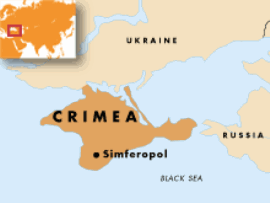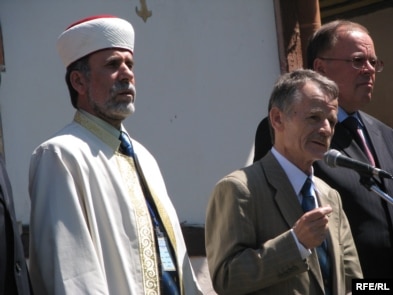Kremlin Asserting Its Influence in Region
By Philip P. Pan
Washington Post Foreign Service
October 6, 2009
SEVASTOPOL, Ukraine — On maps, Crimea is Ukrainian territory, and this naval citadel on its southern coast is a Ukrainian city. But when court bailiffs tried to serve papers at a lighthouse here in August, they suddenly found themselves surrounded by armed troops from Russia’s Black Sea Fleet who delivered them to police as if they were trespassing teenagers.
The humiliating episode underscored Russia’s continuing influence in the storied peninsula on the Black Sea nearly two decades after the fall of the Soviet Union — and the potential for trouble here ahead of Ukraine’s first presidential vote since the 2005 Orange Revolution.
Huge crowds of protesters defied Moscow in that peaceful uprising and swept a pro-Western government into power. Now, the Kremlin is working to undo that defeat, ratcheting up pressure on this former Soviet republic to elect a leader more amenable to Russia’s interests in January.
Russian President Dmitry Medvedev issued a letter in August demanding policy reversals from a new Ukrainian government, including an end to its bid to join NATO. He also introduced a bill authorizing the use of troops to protect Russian citizens and Russian speakers abroad, a measure that some interpreted as targeting Crimea.
A group of prominent Ukrainians, including the country’s first president, responded with a letter urging President Obama to prevent a “possible military intervention” by Russia that would “bring back the division of Europe.” Ukraine gave up the nuclear arsenal it inherited from the Soviet Union in exchange for security guarantees from the United States and other world powers, they noted.
If a crisis is ahead, it is likely to involve Crimea, a peninsula of rolling steppe and sandy beaches about the size of Maryland. The region was once part of Russia, and it is the only place in Ukraine where ethnic Russians are the majority. In the mid-1990s, it elected a secessionist leader who nearly sparked a civil war.
Crimea is also home to Russia’s Black Sea Fleet, which is based in Sevastopol under a deal with Ukraine that expires in 2017. Russia wants to extend the lease, but Ukraine’s current government insists it must go.
“It would be easy for Russia to inspire a crisis or conflict in Crimea if it continues to lose influence in Ukraine,” said Grigory Perepelitsa, director of the Foreign Policy Institute in the Ukrainian Diplomatic Academy. “That’s the message they’re sending to any future president.”
Russia’s state-controlled media, widely available and popular in Crimea, have hammered the authorities in Kiev as irredeemably anti-Russian, and prominent Russian politicians have been calling for reunification with Crimea.
But five years of policies in Kiev aimed at drawing Ukraine closer to Europe and the United States and at promoting Ukrainian language and history have also alienated the region. Ukraine’s president, Viktor Yushchenko, the hero of the Orange Revolution, won only 6 percent of the vote here.
“He tried to force his ideology on us, and he failed,” said Valeriy Saratov, chairman of the Sevastopol city council. “We don’t feel we were conquered by Russia, but by Europe. We fought the Italians, the Germans, the French, the British. . . . We would never take sides against Russia.”
Vladimir Struchkov, a pro-Russia activist and leader of a parents’ organization in Sevastopol, said residents are especially upset about a new regulation requiring students to take college entrance exams in Ukrainian, eliminating a Russian option.
While Kiev is playing identity politics, he argued, Moscow has been investing in Sevastopol, building schools, apartments and pools, repairing monuments and even opening a branch of Moscow State University.
The result has been a sharp shift in Crimean attitudes. In 2006, about 74 percent of Crimean residents regarded Ukraine as their motherland, but by last year, that figure had fallen to 40 percent, according to a survey by the Razumkov Center, a top research institute in Kiev.
Crimea became part of the Russian empire in 1783 after a long period of rule by Crimean Tatars, an indigenous Turkic people. During World War II, Germany captured the peninsula. After the war, the Soviet Union’s Joseph Stalin accused the Tatars of Nazi collaboration and ordered their mass deportation. The Communists then sought to resettle the peninsula with politically reliable families, mostly Russians with ties to the military or the party apparatus.
When the Soviet Union collapsed, these people suddenly found themselves living in Ukraine instead of Russia, because Soviet leader Nikita Khrushchev had transferred Crimea to Ukraine in 1954 in a move that had little impact at the time.
Today, about 60 percent of the region’s 2.3 million residents are Russian and 25 percent are Ukrainian. But the two ethnic groups are thoroughly intertwined. Opinion polls show majorities of both want the Black Sea Fleet to stay and support reunification with Russia, though there is similar support for greater autonomy for Crimea within Ukraine.
Crimean Tatars, who were allowed to return in the 1980s, make up about 10 percent of the population and are largely opposed to a return to Russian rule.
Refat Chubarov, a leader of the main Crimean Tatar political organization, said Russian media have vilified his people as criminals, playing on fears of Islam and their efforts to reclaim lost homes. But even among the Tatars, frustration with Kiev is rising.
“We are the strongest supporters of Ukrainian sovereignty in Crimea,” Chubarov said. “But the disappointment is growing because the authorities have not done enough to provide land and other compensation to returning families.”
Volodymyr Pritula, a veteran journalist and political analyst in Crimea, said the Kremlin has been trying to provoke ethnic conflict in the region, both to undermine the Ukrainian government and provide an excuse for intervention.
Three years ago, Vladimir Putin, then Russia’s president, offered to help resolve tensions in Crimea after a clash between Russians and Tatars and suggested that the Russian fleet should stay to “guarantee stability,” Pritula noted.
In recent months, he added, the Kremlin has stepped up its activities, with Russian nationalist groups staging protests on Ukrainian holidays and media outlets resuming the attacks on Tatars after a pause last year.
Emotions have been running high since Russia’s war last year with another pro-Western neighbor, Georgia. The Black Sea Fleet participated in the conflict, and Ukrainian officials infuriated Russia by suggesting its ships might not be allowed to return to Sevastopol.
Tensions flared again this summer when Ukrainian police stopped Russian trucks three times for transporting missiles in Sevastopol without advance notice. Then came the episode with the bailiffs at Kherson Lighthouse, one of dozens of navigational markers along the Crimean coast that both Ukraine and the Russian fleet claim to own.
Judges have tried to order the fleet to hand over various facilities before, with the Russians routinely refusing and bailiffs departing without incident. But this time, the fleet accused Ukraine of “penetrating the territory of a Russian military unit” and warned of “possible tragic consequences to such actions.”
Vladimir Kazarin, the city’s deputy mayor, said the bailiffs stepped past a gate because no sentries were posted but quickly found the commanding officer, who asked them to wait while he sought instructions. Five minutes later, he returned with the soldiers who detained the bailiffs.
“Relations with the fleet have generally been good,” Kazarin said. “But this just shows that people in Moscow are trying to find any excuse for conflict.”







 Mustafa Dzhemilev (center) said he knows from diplomatic sources about FSB plans to have him killed.
Mustafa Dzhemilev (center) said he knows from diplomatic sources about FSB plans to have him killed.